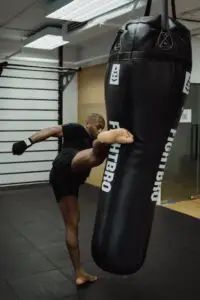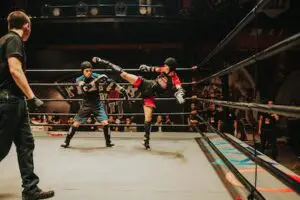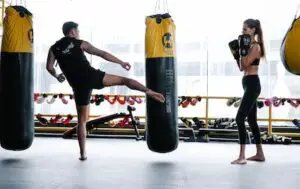Muay Thai, also known as the “Art of Eight Limbs,” is a dynamic combat sport and martial art that originates from Thailand. Aspiring practitioners often wonder how long it takes to learn Muay Thai and achieve proficiency in this striking discipline. While the duration can vary based on several factors, including individual commitment, training frequency, and natural ability, this article aims to provide an insightful overview and answer the burning question: How long does it take to learn Muay Thai?
What is Muay Thai?
Muay Thai is a traditional martial art and combat sport that combines strikes, clinching techniques, and powerful kicks. Known for its emphasis on both offensive and defensive maneuvers, Muay Thai utilizes the eight limbs of the body—fists, elbows, knees, and shins—for striking and grappling. It requires agility, endurance, strength, and mental fortitude.
What factors affect the learning duration?
Several factors influence the time it takes to learn Muay Thai. These include:
- Individual commitment: The level of dedication and consistency an individual puts into training plays a significant role in progress. Regular practice, attending classes, and self-discipline contribute to skill development.
- Previous experience: Individuals with prior experience in martial arts or combat sports may have an advantage, as they may already possess certain skills and physical attributes that can be applied to Muay Thai.
- Physical fitness level: One’s overall fitness level, including cardiovascular endurance, flexibility, and strength, can impact the learning process. Being in good physical shape can enhance progression.
- Training frequency and intensity: The frequency and intensity of training sessions matter. Regular and intense training can expedite the learning process, while sporadic or inconsistent training may prolong it.
- Natural ability: Some individuals may have a natural inclination towards martial arts, which can facilitate learning. However, with consistent training, anyone can improve their skills.
What are the different skill levels in Muay Thai?
Muay Thai proficiency is typically divided into different skill levels, commonly referred to as “Khan” or “Prajioud” levels. These levels vary from gym to gym, but they generally follow a similar progression:
- Beginner Level: This level focuses on mastering basic techniques, footwork, and conditioning. It typically takes several months of consistent training to advance beyond the beginner stage.
- Intermediate Level: At this stage, students begin to refine their techniques, learn more complex combinations, and develop better sparring skills. Progression to this level often takes around a year or more, depending on individual dedication.
- Advanced Level: Advanced practitioners have a deeper understanding of Muay Thai strategies, demonstrate superior technique execution, and possess advanced defensive skills. Advancing to this level usually requires years of dedicated practice.
How can one accelerate the learning process?
While the learning process in Muay Thai is unique to each individual, there are several effective ways to accelerate progress:
- Consistent training: Regularly attending classes and dedicating sufficient time to practice is crucial. Aim for a structured training schedule that balances technical instruction, conditioning, and sparring.
- Supplemental training: Engage in supplementary activities like strength training, cardio exercises, and flexibility training to enhance your overall fitness level, which can directly impact your performance in Muay Thai.
- Focused drilling: Spend dedicated time practicing specific techniques and combinations. Repetition and refinement of movements can help build muscle memory and improve execution.
- Seek quality instruction: Enroll in a reputable Muay Thai gym with experienced instructors who can provide proper guidance, correct form, and valuable feedback. Qualified trainers can significantly accelerate your progress.
- Watch and study fights: Observe professional Muay Thai fights and analyze the techniques and strategies employed by experienced fighters. This can deepen your understanding and inspire new approaches to your training.
Can someone become proficient in a short time?
Becoming proficient in Muay Thai in a short period is challenging, as it requires consistent effort and time. While it’s possible to acquire some basic skills within a few months of dedicated training, reaching a high level of proficiency typically takes years of practice and experience.
It’s essential to set realistic expectations and understand that progress varies among individuals. The learning journey is a continuous process, and patience, persistence, and perseverance are key to success.
How does sparring contribute to skill development?
Sparring plays a vital role in developing Muay Thai skills. It allows practitioners to apply techniques learned in a controlled and dynamic environment. Benefits of sparring include:
- Practical application: Sparring provides an opportunity to practice techniques against resisting opponents, replicating real-life combat scenarios.
- Timing and reflexes: Regular sparring sharpens reaction time and improves the ability to read opponents’ movements, enhancing defensive capabilities.
- Strategy development: Sparring helps in understanding different fighting styles, developing effective strategies, and adapting to various opponents.
- Conditioning and endurance: The physical demands of sparring contribute to cardiovascular fitness, stamina, and overall conditioning.
- Mental toughness: Sparring builds mental resilience, as practitioners learn to overcome fear, stay calm under pressure, and make split-second decisions.
Conclusion
The duration required to learn Muay Thai depends on various factors, including commitment, training frequency, prior experience, and individual aptitude. While basic skills can be acquired within a few months, achieving proficiency and mastery typically takes years of dedicated practice. The key is to approach the learning process with discipline, consistency, and a growth mindset. Remember, Muay Thai is a journey that involves physical and mental development. Embrace the challenge, enjoy the process, and let the art of Muay Thai shape you into a skilled practitioner.





